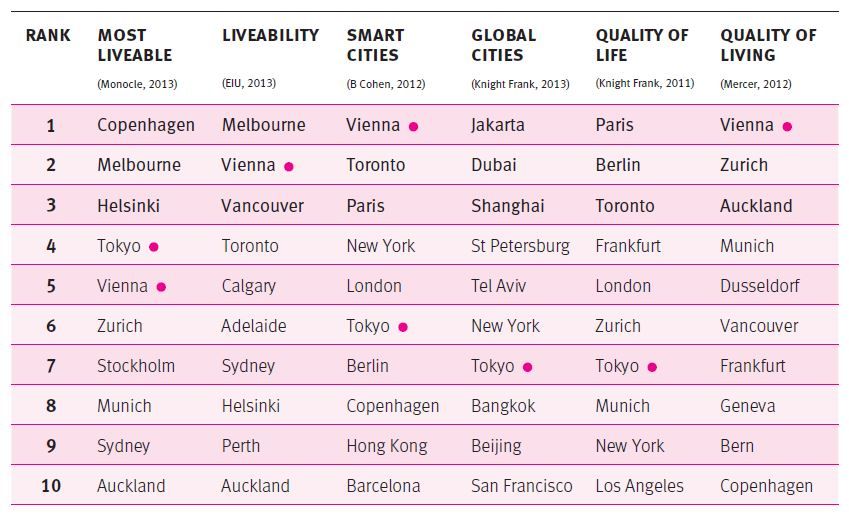Which city is the ‘best’ in the world? A plethora of city rankings are available, each proposing to know just this. However, rather than asking which is the ‘best’ city, perhaps a more useful question is ‘what makes a successful city?’ or even, what makes a city ‘great’?
City rankings
Here we examine how global cities have been compared, and discuss what we can learn from the findings.
Cities are typically ranked on the following credentials: green, digital, global, liveable, future and smart. Each of these alone can use up to 30 individual attributes. However, by paring it back to the fundamentals, we have established that a city needs to work on three levels: economic, environ-mental, and liveability. In other words, it must provide a thriving economy and good quality of life with the minimum impact on the environment. With this in mind it is interesting to note the degree of commonality between the city rankings (See figure 1).
Figure 1 Comparison of city rankings
As illustrated Tokyo and Vienna each appear four times () and nine cities appear three times. This reflects both a key strength and weakness of these rankings. Their strength is that they rely on data to make them objective, but their weakness is the sometimes limited avail-ability of good data which is compound-ed by the fact that some respondents won’t have had experience of other cities and therefore be unable to compare theirs to others.
A danger therefore with reading too much into these rankings is the bias towards big cities which tend to have better and more data. Our view is that size shouldn’t matter so long as the city is economically and environmentally sustainable and is liveable.
A Happy City
According to Charles Montgomery, author of ‘A Happy City’, “Connected people sleep better at night. They live longer. They consistently report being happier.”
He was referring to social connectivity rather than to transport, but there is a clear link. Research shows that someone with a one-hour commute has to earn 40% more money to be as satisfied with life than someone who walks to the office. So, while a nice car can boost status and a sense of freedom, the realities of cities make this an illusion , and those commuters who report being happy are those who travel under their own steam by walking or cycling.
The implication is that the best cities are ones which encourage walking and cycling, with the role of motorised modes focused on journeys which cannot be undertaken another way.
